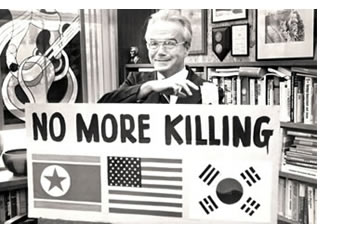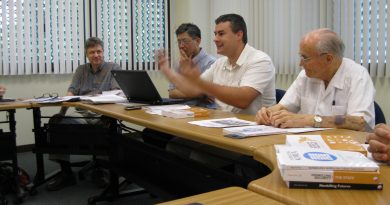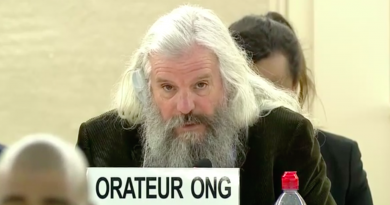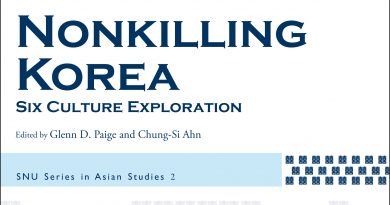Tampa Tribune Editorial: “A vision of a nonkilling world”
Reproduction of the editorial piece from The Tampa Tribune, published on October 2013. The Tampa Tribune is a daily newspaper published in Tampa, Florida, with a circulation of 226,990.
What the world needs now is more people like Dr. Glenn Paige, who is far better known in parts of Africa than anywhere else but whose message has a universal appeal: the end of killing.
Sunday’s New York Times described him as a “cherub-faced retired political science professor” who lives in Honolulu. And in Congo and Rwanda he’s having a significant impact on young people who have grown up in an environment of virtually perpetual violence.
In 2002, he published a textbook called “Nonkilling Global Political Science” and, because it was translated into Swahili (and 30 other languages), its message is being taught to more than 200 pupils in the Glenn Paige Nonkilling School in a village in Congo.
In the past 20 years, an estimated 6 million people were killed in Congo and Rwanda.
Page’s principles are also being explained to unschooled adults in the same Congo village. Bishop Mabwe Lucien of the Pentecostal Assemblies of God churches in Congo has described Paige’s concept as “new and revolutionary,” and he added that “nobody in the region had heard these ideas.”
In fact, the bishop continued, upon being exposed to the Paige training program, “the hands of assassins were raised to denounce killing.”
The bishop founded the Center for Global Nonkilling-Great Lakes Africa and hired trainers from nonprofit groups to spread the center’s message to people in 1,100 villages and towns. He has distributed 4,500 books and persuaded 30,000 others to work for a nonkilling society.
This, he said, has caused the level of violence to drop, although he gave no specific numbers.
The concept of a “nonkilling world” comes close to being unbelievable, given human nature and history. But at least in Congo it appears to be succeeding. And if it succeeds there, shouldn’t it be considered elsewhere, including here in the United States?
Last year in Chicago there were 500 murders, with innocent bystanders, including children, among the victims. And Chicago is by no means the only U.S. city where homicides are a plague on what is supposed to be a civil society. There were 14 others that recorded more than 100 murders in 2012.
But while murder may be a major problem here in the United States, there are other kinds of killings occurring daily elsewhere, and the typical targets are what we might refer to as “the other” — members of rival tribes or ethnic groups, different religions or competing political factions.
For example, just this year, estimates of civilian deaths from violence in Iraq — the nation we thought we had liberated from the brutal tyranny of Saddam Hussein — range from 114,000 to 125,000. Mostly these killings are driven by the bitter, age-old rivalries between the two main branches of Islam, Sunni and Shia. Would either side listen to Paige? Maybe not.
Paige describes a “nonkilling world” as one without killing, threats to kill or conditions conducive to killing — and one in which there is no dependence on killing or the threat of killing to produce change. That’s not a description of Iraq or Syria or Egypt, to name just a few current hot spots.
The author explains that the concept of nonkilling has three strengths: First, it is measurable in that it focuses on stopping the taking of human life, unlike the more abstract terms of “peace” or “nonviolence.” Also, it calls for no specific type of society, government or laws, but rather urges individuals and institutions worldwide to create their own interpretations of nonkilling. Finally, nonkilling draws its inspiration and strength from a wide variety of religious and humanist sources that all teach a respect for life.
When university presses rejected his book, Paige posted it on the Internet and gave it away, free. Within five years it was translated into 15 languages. It is now available in 30 languages.
Given its success in Congo, might it not be useful elsewhere, even if it saves just a few lives? Where’s the downside?




